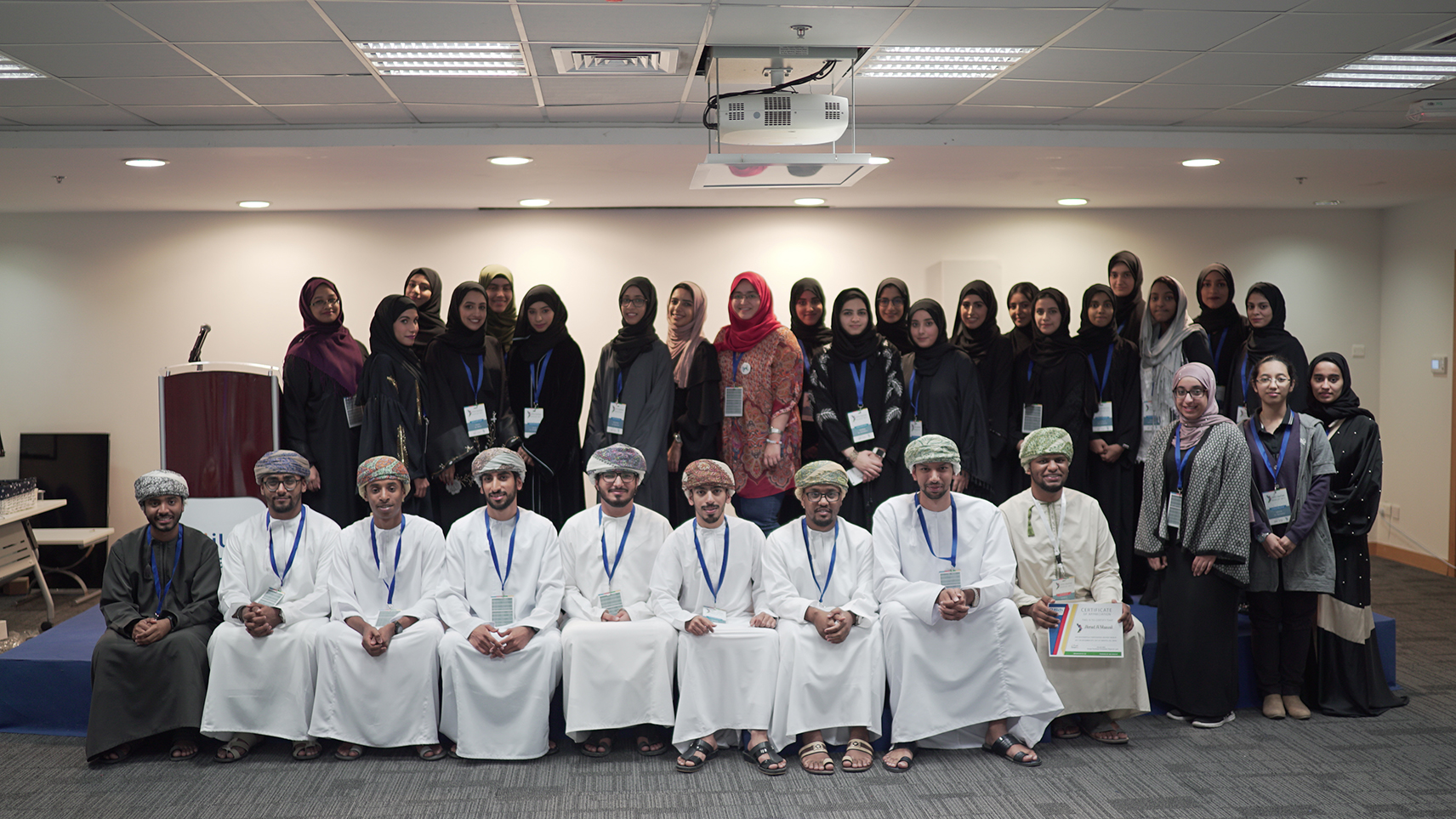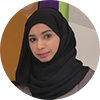March 2018
GDG Muscat proves that a clear vision and passion for community goes a long way, even in a short time. Besides being the lead organizer, Alya Al Shanfari is also a startup founder. In a little over a year, she and her team became known for delivering professionally organized events and creating a network of stakeholders helping them to scale their reach. How were they able to achieve it? Alya shared some tips in the following interview.

Alya, where did you find inspiration when you were growing up?
Since I've been exposed to the world of technology since a very young age, it was quite obvious that I would pursue a career in IT. I participated in a lot of tech related competitions and achieved several international recognition and my family was always very supportive of this. I recently graduated in Computer Science from the German University of Technology (GUtech) and founded my own startup.
Are there many young women seeking careers in IT in Oman?
I would say the society is very supportive of women entering the workforce in general. There are strong role models, women in managerial positions locally and internationally, like Her Excellency Hunaina al-Mughairy, the Ambassador of Oman in the USA. Speaking of the current youth in IT careers, I would say more women are entering the field than men.
How did you first learn about GDG?
Being a student, I always wanted to do something aside from studying. I had the idea of organizing a TEDx event and I thought why not, so I managed to put a team and we organized a TEDx event in cooperation with my university. TEDxGUtech was the first TEDx event with a university licence in Oman and that inspired me to dream bigger. It was quite challenging - we really didn't have much experience and were learning by doing. The event went very well, but we were really exhausted afterwards (laugh).
The university reached out to us to host another event that would be inspiring and impactful for students. Meanwhile, I was browsing on Twitter and came across #Hash Code and wanted to participate. There wasn't an event hub in Oman, so we decided to host one. We had ~100 students participating that stayed up until 1am to code. I had some questions related to the organization, so I reached out to Google Arabia to get some insights and that is how I got introduced to the GDG program.
What happened after you talked to Google?
I was really excited and presented the idea of starting a chapter to my friends. There were about ~20 of them who wanted to participate. #HashCode was a perfect opportunity to introduce GDG to our (target) audience. In February 2017, we officially became GDG Muscat.
What are some of your chapter's milestones so far?
Besides the #HashCode event, we hosted a Women Techmakers Summit. We also hosted several meetups on Google related technology such as Google I/O Extended, IoT meetup, DevFest event and we partnered with local hackathons and events to provide the attendees with technical workshops. As of now, we focus on creating partnerships in order to have more impact when organizing events together. Additionally, we had some great opportunities, for example, I was involved as a speaker in the Google Developer Roadshow in Makkah, KSA. Four of our organizers attended Google I/O 2017, two others attended the Women Techmakers MENA Summit, and another two organizers attended the Google Developer Days in India. This is a huge motivation for the team.
How big is your team of organizers?
We're 48 organizers and many volunteers. According to Meetup.com, we have 372 members. Starting from our DevFest, we had everyone signing up through Meetup.com, and the same applies with our upcoming events so that it helps us to increase the number.
It seems that you have a pretty big team. How do you organize and divide your work assignments?
We assess everyone's skill set first and based on that, we offer them to join a team. We have team leaders for Media and Branding, Development, PR & Finance. We have internal onboarding trainings for newcomers to get started. We’re basically learning from each other depending on their expertise.
You mentioned trainings. We often hear about members being hesitant about speaking in public. Do you have the same experience?
I do, actually. For DevFest 2017, we noticed potential in one of the organizers, but he had to overcome his fear of public speaking. We pushed him a bit and he managed to give a great talk. We try to look for “hidden talents” and empower them, it’s always great to learn from personal experiences.
You were talking earlier about partnerships. Can you share some of your experience in working with sponsors?
Definitely. As we have collaborated from the beginning with many organizations, we were able to achieve quite a lot of visibility that opened new doors for us by being associated with Google through the GDG brand. We're very thorough and open when preparing our sponsorship proposals. We focus on giving the sponsors packages to choose from, which makes it easier for them to decide which package to select with the associated benefits. Omantel, the first telecommunications company in Oman, is one of our biggest supporter through most of our events and meetups.
Generally, we experience positive feedback from the public and the attendees. They appreciate when they see young people putting energy into something meaningful. The same goes for companies - they also support students with offering internships, job offers if they see it's not a commercial activity.
Alya, you mentioned that you already graduated from university. What are you focusing on now?
I started my own company, Beennova, as a result of being selected as one of the 3 top graduation projects in the Sultanate through the Upgrade program. We have received funding and business support for 3 years in a local incubator. We focus on smart cities and internet of things using high end technologies. We have created a platform for organizations and institutions to provide the user with a unique experience and also to empower the business with a set of tools to understand user behaviour.
It seems that you have a lot of things going on. How do you manage your time?
Having support from your team is key. We are very organized. As students, we had to juggle studying in one of the top universities with a challenging curriculum and creating time to prepare and organize events and participate in competitions. We scheduled tasks and work accordingly.
You come across as someone with a strong vision and ‘let's do it’ approach. What do you think is the most important when building a sustainable community?
I believe in creating opportunities for everyone, not just yourself. Nowadays with everything being online, the possibilities are almost limitless. With passion and determination you can achieve almost anything.
I agree, knowledge is accessible more than ever. However, the amount of information and possibilities can be very overwhelming. What helps you to stay focused on what's really important?
I'd say, give yourself a year to try out as many things as possible. Technology is a rapidly changing environment. I tried a lot of programming languages before I found what I’m best at. I know for myself that Firebase, for example, is something I will be using long—term.
You talked before that you and other GDG Muscat members have strong commitment to organize your tasks. Are there any tools that help you in this process?
We're using Slack for internal communication. We started on focusing on partnerships with university students to accommodate interest of volunteers wanting to get involved. We are in the process of having a contact person at each university, as we already started with two universities. They’re like our ambassadors within their campus. We know that students will impact other students and help us to scale our reach.
What challenges (if any) are you dealing with right now?
Having enough time to do everything we want is our only real limitation (laugh). All organizers have many things going on. What helps us is to have ‘backup’, meaning having several people with similar skills that can fill in for each other based on their availability.
What are some things that you're looking forward to in 2018?
We want to organize as many Google technology related events as possible to impact the community and also offer a variety of opportunities. Having contacts at different universities will help us to spread the workload of organizing events. As a team, we now understand what it takes to organize an event. Our community trusts us that we can deliver what we promise. I’m looking forward to 2018 and everything that lies ahead. My current focus is also to motivate others to actively create their own opportunities, not just wait for things to happen.

